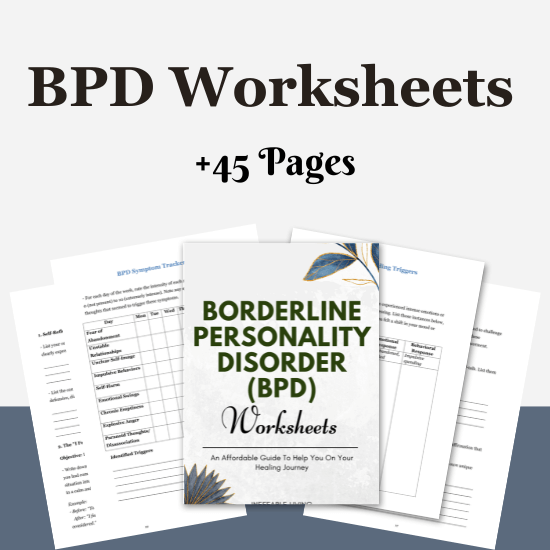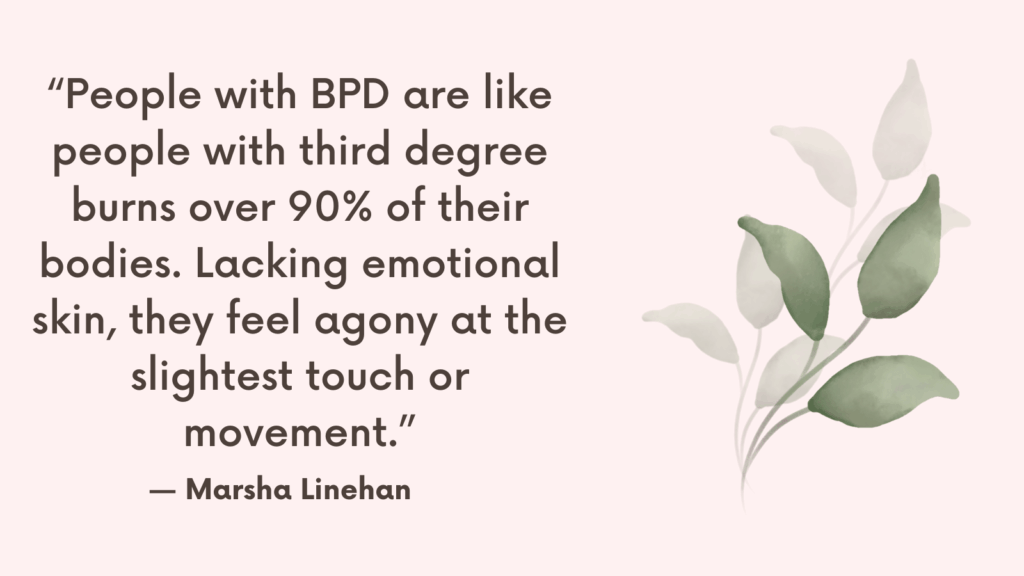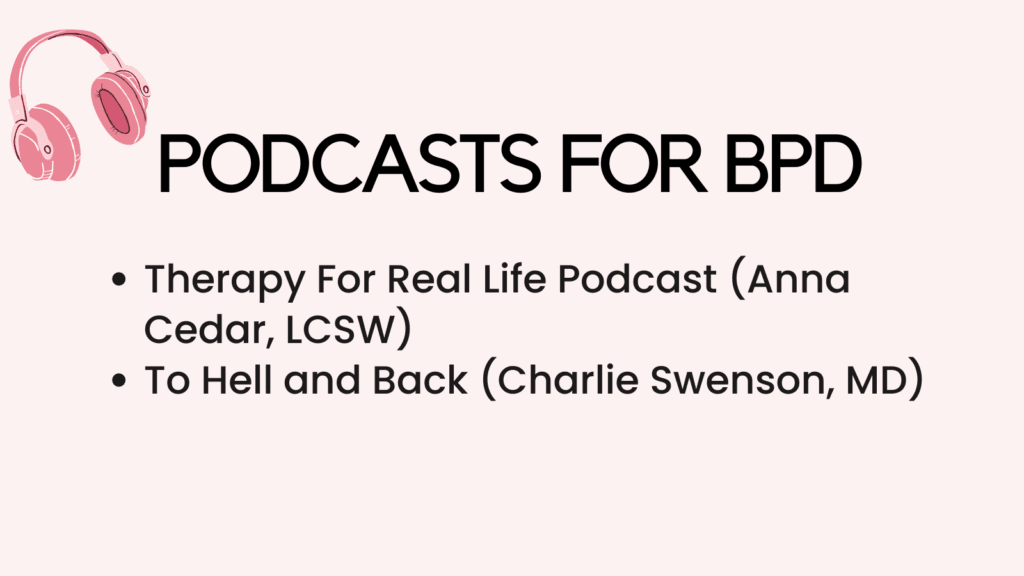One of the most painful and confusing patterns in Borderline Personality Disorder (BPD) is this: loving someone deeply — and still pushing them away. If you live with BPD, you may know this cycle well. You want closeness, crave connection, even fear abandonment… and yet when someone gets too close, you might start an argument, ghost them, or end the relationship impulsively.
This isn’t because you’re manipulative, broken, or don’t care. It’s because your brain is trying to protect you — in a way that feels safer than the pain of potential rejection.
Here’s why this happens and what it means.
What is BPD?
Borderline Personality Disorder (BPD) is a mental health condition characterized by intense emotional instability, fear of abandonment, difficulty maintaining relationships, and a fluctuating self-image. People with BPD often feel emotions more deeply and for longer periods, making everyday life and relationships feel overwhelming or unpredictable.
Core features include:
- Rapid mood swings and intense emotions
- Chronic feelings of emptiness
- Fear of real or imagined abandonment
- Impulsive behaviors (e.g. spending sprees, binge eating, risky sex)
- Difficulty trusting others and unstable relationships
- Intense episodes of anger, anxiety, or depression
- Self-harming behaviors or suicidal thoughts
BPD isn’t a choice or a character flaw — it’s often rooted in trauma, sensitive temperament, and early attachment issues. With therapy and support, emotional regulation is absolutely possible.
Related: What Is Quiet Borderline Personality Disorder?
Why People With BPD Push People Away (Even When They Love Them)
1. Fear of Abandonment Feels Like Certainty
People with BPD often live with a deep fear of being abandoned. Even small signs — a slow reply, a change in tone, someone needing space — can trigger panic. Your brain doesn’t wonder if they’ll leave — it assumes they will.
So pushing them away becomes a form of control: “If I end this first, it won’t hurt as much when they do.”
It’s not that you want to lose them — it’s that losing them on your own terms feels less terrifying than waiting for it to happen.
2. Emotional Intimacy Feels Dangerous
Closeness often feels amazing at first — but then suddenly terrifying. You might start wondering:
- “What if they see the real me and leave?”
- “What if I become too dependent?”
- “What if I get hurt like before?”
So you distance yourself — not because you don’t love them, but because the vulnerability feels unbearable.
Related: Best 20 Tips On Dating Someone With BPD Without Becoming A Caretaker
3. Shame Says “You’re Too Much”
Many people with BPD carry intense shame. You may believe that you’re unlovable, broken, or doomed to mess things up. When someone loves you, part of you may feel like you’re tricking them — like if they really knew you, they’d leave.
So when things get close, shame takes over: “I need to push them away before they see how awful I really am.”
This isn’t about ego. It’s about survival.
4. Black-and-White Thinking Creates Sudden Shifts
BPD often causes splitting — a cognitive distortion that leads you to see people as all good or all bad. One small disappointment can cause a sudden emotional shift:
- “They don’t love me.”
- “They’re going to hurt me.”
- “I can’t trust them.”
When this happens, pushing the person away may feel like the only way to protect yourself.
5. Past Trauma Triggers Present Fear
If you’ve experienced betrayal, abuse, neglect, or loss, your body remembers it. Even when you’re in a safe, loving relationship now, your nervous system may be bracing for the next emotional blow.
So when love starts to feel too safe, you might create distance — because your body doesn’t trust that safety will last.
Related: How to Detach From Someone with Borderline Personality Disorder?
6. You Want Reassurance, But Don’t Know How to Ask
Sometimes the push isn’t about wanting distance — it’s a cry for closeness.
You might start a fight, withdraw, or say “just leave” — not because you want the person gone, but because you want them to fight for you, reassure you, or prove they care.
This is often subconscious — but it can create chaos in relationships that otherwise feel good.
7. You’re Trying to Control the Outcome
For someone with BPD, unpredictability is a major emotional trigger. Pushing someone away gives a sense of control: “If I destroy it now, I won’t have to wait for it to fall apart later.”
The pain of loss feels inevitable — so sabotaging the relationship is a way to predict and prepare for it.
8. The Guilt After Pushing Them Away Feels Crushing
After pushing someone away, it’s common to feel:
- Intense guilt or shame
- Fear they’ll never come back
- Regret but also fear of reaching out
- Self-loathing for “ruining it again”
This can lead to more withdrawal, making it harder to repair the rupture.
Related: How to Love Someone with BPD? Top 9 Suggestions
What You Can Do Instead (When You Feel the Urge to Push Someone Away)
Here’s what you can do instead of pushing someone away — especially when you feel triggered.
1. Pause Before You React
You don’t have to act on the first wave of emotion.
Tell yourself: “This is a moment. I don’t have to decide anything right now.”
Use a 10-minute rule: wait, breathe, ground. Give your emotions space to settle before you text, speak, or walk away.
2. Name the Real Emotion Underneath
Ask yourself:
- Am I feeling abandoned?
- Am I ashamed or afraid of being too much?
- Am I hurt and trying to protect myself?
Often, the urge to push away is really about needing comfort, reassurance, or safety. Identifying the real feeling helps you respond with clarity instead of fear.
3. Say What You Need Instead of Acting It Out
Use direct, vulnerable language:
- “I’m feeling really overwhelmed right now. Can you help me feel grounded?”
- “I’m scared you’re going to leave. I know that’s my fear talking, but I just needed to say it.”
- “I feel like pushing you away right now, but what I really want is to feel close.”
Honesty builds connection — not distance.
4. Use a Grounding Tool
When the emotional surge hits, calm your body first:
- Splash cold water on your face
- Hold an ice cube
- Press your feet firmly into the ground
- Breathe: in for 4, out for 6
- Count 5 things you can see, 4 you can touch, 3 you can hear…
Regulating your nervous system helps your mind re-engage with reality.
Related: How To Comfort Someone With BPD? Top 6 Strategies
5. Write Instead of Reacting
Open a notes app or journal. Vent everything you’re feeling — uncensored.
Then ask yourself: Do I want to send this? Or do I just need to express it?
Writing gives your feelings somewhere to go without damaging the relationship.
6. Create a “Connection Plan” for Triggering Moments
Make a list to use when you feel disconnected:
- One person you can text for grounding
- A voice memo or message from a loved one
- A calming playlist
- A reminder: “They are allowed to take space — it doesn’t mean they’ve left me.”
This gives you structure when your brain says everything is falling apart.
7. Practice Opposite Action
If your urge is to block, ghost, or lash out — do the opposite.
- Stay in the conversation calmly
- Ask for a hug or call instead of pulling away
- Say something kind, even when you want to be defensive
You’re not denying your feelings — you’re rewiring your response.
8. Remind Yourself: The Urge Is Temporary
Emotions feel permanent in the moment, but they pass.
Say:
- “I’ve felt this before and survived it.”
- “I don’t have to act on every feeling.”
- “Connection can survive this discomfort.”
Let the wave pass before you make any big decisions.
9. Repair Gently If You Do Push Away
If you’ve already shut down, lashed out, or pulled away, you can still repair:
- “I got scared and pushed you away. I’m sorry — I didn’t mean to hurt you.”
- “I’m trying to understand my patterns. Thanks for being patient with me.”
You don’t have to be perfect. You just have to keep trying.
Related: Borderline Personality Disorder (BPD) Resources (Information, APPS, Podcasts, TED Talks, Books)
If You’re Being Pushed Away by Someone With BPD
Loving someone with Borderline Personality Disorder (BPD) can be intense, confusing, and deeply emotional — especially when they suddenly pull away. One moment, they may seem deeply connected. The next, they might go cold, start a fight, block you, or say hurtful things they don’t fully mean.
It’s tempting to take it personally — but what’s happening is rarely about you. It’s about fear, shame, and emotional survival. Here’s how to navigate this pattern with clarity, empathy, and boundaries.
1. Understand the Push-Pull Dynamic
In BPD, people often crave connection but fear it at the same time. When someone gets too close or triggers vulnerability, they may push that person away to protect themselves from perceived rejection, abandonment, or shame.
The push is not about lack of love — it’s often about too much fear.
2. Don’t React Emotionally to the Push
When you’re pushed away, your first instinct might be to panic, get defensive, or try to “fix” it. Instead:
- Stay calm.
- Give them space if they ask for it.
- Avoid matching their emotional intensity.
Their nervous system is likely overwhelmed. Adding more pressure can escalate the fear.
3. Set Boundaries Without Threats
You don’t need to tolerate verbal abuse or emotional chaos to be supportive.
You can say:
- “I care about you, but I won’t stay in conversations where I’m being insulted.”
- “I’m here for you when you’re ready to reconnect — but I also need respect.”
- “I know this is hard for you. I’m not leaving, but I am taking space.”
Boundaries aren’t rejection — they’re a form of stability.
4. Don’t Take the Push Personally
It may feel personal — especially if they say things like “I hate you” or “Just go away.” But underneath that is often fear saying:
- “I’m scared I’ll lose you.”
- “I don’t know how to let someone love me.”
- “Please prove you won’t leave.”
Try to hear the fear beneath the words — while still protecting your own well-being.
5. Let Them Regulate Before Reconnecting
Trying to reason with someone in the middle of a dysregulated emotional episode usually doesn’t work. It’s okay to wait until they’re calm.
You can say:
- “Let’s take some time to cool off. I’ll check in later.”
- “I’m not abandoning you. I just want us both to feel safe before we continue.”
- “I care about you, and I’ll be here when we can talk more gently.”
You’re not withdrawing — you’re co-regulating.
Related: Emotional Permanence: Top 6 Ways to Cope (+FREE Resources)
6. Offer Reassurance Without Overexplaining
Sometimes a brief, grounded reminder is enough:
- “I still care about you.”
- “I’m not going anywhere.”
- “This doesn’t mean I love you less.”
Avoid long justifications or emotional chasing. Calm, consistent presence works better than emotional intensity.
7. Know When to Repair — and When to Step Back
Once emotions cool, gently reopen the door:
- “Are you open to talking about what happened earlier?”
- “I know that was a rough moment. I’d like to understand what was going on for you.”
If they’re not ready — that’s okay. You’ve shown up. The rest is theirs to work through.
But if the pattern repeats without accountability or change, you have the right to ask yourself:
- Is this sustainable for me?
- Can I continue to show up without being hurt repeatedly?
8. Protect Your Own Mental Health
Supporting someone with BPD can be emotionally taxing. You need support too.
Talk to a therapist, journal your experience, take breaks, and prioritize self-care.
Loving someone with BPD doesn’t mean sacrificing yourself. Healthy love includes you in the equation.

Conclusion
If you push people away even when you love them, it doesn’t mean you’re broken. It means there’s a scared part of you that’s trying to stay safe. With time, tools, and self-compassion, that part can learn that love doesn’t always mean pain — and closeness doesn’t always lead to loss.
You are not too much. You are someone learning to trust love — and that’s an incredibly brave thing to do.



![BPD Support Groups [Online & In-Person]](https://ineffableliving.com/wp-content/uploads/2022/09/Borderline-Personality-Disorder-Support-Group-1024x576.png)